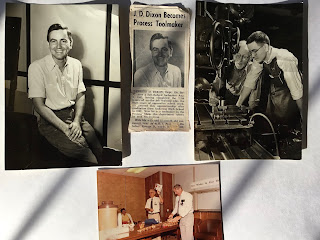Monday, March 24, 2008
Skilled Trades and Technical Workers
We have a lot of college grads in the family now. But we also have a tradition of producing skilled and technical workers. My brother Jay was one... he was a millwright. Rich was one in the Air Force, before he turned to teaching. Tim is another one. Jim is, or used to be. These are jobs where you use your brain and your hands, often at the same time!
When I was in charge of the district curriculum in Okeechobee, I worked with the high school principal and others to encourage kids to consider going into skilled trades and other technical fields. We pointed out that these individuals often made more money (actually, a lot more in many cases) and were in greater demand than most college graduates. The program was called Tech-Prep.
My dad, Jerry Dixon, became an engineer at Delco. But first he was a skilled tradesman. Generally, the route to becoming a skilled tradesman was to complete an apprenticeship, which involved coursework and work on the job with a master or "journeyman" in the specialty.
I knew Jay would know more about Dad's years as a skilled tradesman. Jay sent this email describing the route Dad took after high school and one semester of study at Purdue:
Dad started his career at delco remy around 1949 or 1950 at age 19 or 20 with a toolmaker apprenticeship. It probably took around 4 years to become a full fledged toolmaker. After another period of time and experience he moved to tool and die maker. All of this training took place in what was called the process toolroom, department 130 in plant 1 on the main floor. He would have machined and made parts for dies that stamped out parts in punch presses, and parts for any machines under the control of the process engineering department. He became a shop foreman in dept 130 shortly after his diemaker advancement and after a few years he was promoted to process engineer on the 3rd floor in plant 1.
This was the job he loved. He would look at machines producing parts and the process associated with them and try to either improve the process i.e., reducing waste or scrap or by redesigning the machine or its parts to make the parts more easily or better or with less time. Dad worked mainly with cold forming machines such as punch presses both small and extremely large (400 tons). He also worked on machines called headers which were also large presses, only they lay horizontally instead of vertically. He made and designed dies (a stamping device that actually forms the part) mostly made of a material called carbide, a very hard metal. When a press would come together with 400 tons of force and the metal being fed into the die didn't line up exactly, the parts of the die and the metal being fed would make a truly ugly wreck. Sometimes it would take weeks to repair it to normal state. Dad didn't usually curse much but when months of work was destroyed in one of these wrecks and he had to work weeks of 16 hour days (and nights) to keep the plant running and the parts flowing to the assembly plants, he could vent with the best of us. Dad loved the challenge of taking on a problem, especially one that everyone said couldn't be solved. I know some will say I'm prejudiced but I knew many, many skilled tradesmen, foremen, and upper management that worked with him who would tell you that he was extremely good at his job. He solved problems one step at a time.
National Header Corp. once told GM that a "clutch shell" (part of a starter that turns the engine over to start your car) "could not be made on a header". After a few years and many wrecked dies and redesigns, dad was making a four lobe clutch shell on a National Header in Dept. 312 (a machine I also was called to work on the headers conveyors etc. often). The four lobe clutch shell was a small piece for small four cylinder cars. A few years after this dad modified the same header to produce 6, 8, 10, and even 12 lobe clutch shells on the same machine whose company said he couldnt make a clutch shell at all.
I remember that Dad also taught apprentice courses in the early years, including Algebra. Thankfully, I was a natural at Algebra and had a good (a little unorthodox, but good) teacher in high school. Can you imagine having the usual problems with Algebra when you're dad used to teach the stuff!
I also remember that back in the day, apprentices had to purchase their own tools, and there were a lot of tools required in these jobs. Mom talks about some tools costing more than their monthly rent. Later on, I think better contracts led to tool allowances to help with the purchase of tools.
I'd love to hear other stories from some of the skilled/technical workers in the family!
Subscribe to:
Post Comments (Atom)

No comments:
Post a Comment